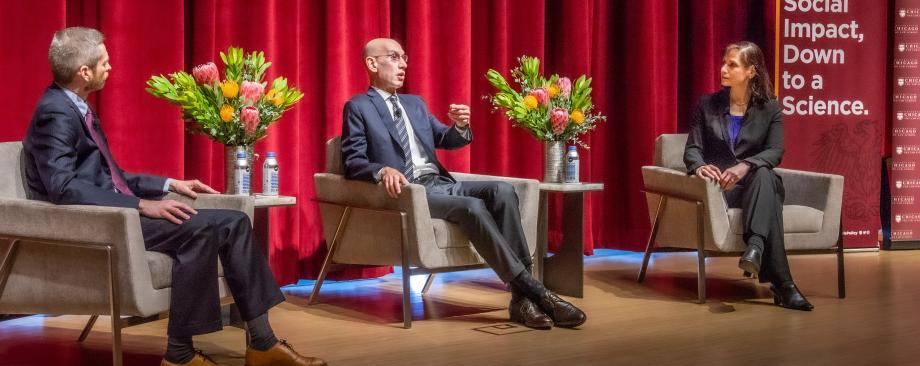In UChicago Visit, NBA Commissioner Adam Silver, ’88, Says He Still Relies on Problem-Solving Skills He Learned at the Law School

NBA Commissioner Adam Silver, ’88, still thinks of himself as a lawyer.
After all, it’s the skills he learned at the Law School, and later as a judicial clerk and law firm associate, that undergird his approach to the complex issues that have defined his tenure as NBA head, including high-profile decisions related to COVID policy, international relations, and more.
“The problem-solving, issue-spotting techniques that you learn, particularly at the University of Chicago, [including] how to reason through issues—I find I use those skills every day of my life, and I really feel indebted to the Law School as a result,” Silver said at a March 22 event cohosted by the Law School and the University’s Harris School of Public Policy.
Silver, who joined the NBA in 1992 and became commissioner in 2014, appeared before a packed auditorium in the Rubenstein Forum for a Q&A with Law School Dean Thomas J. Miles, the Clifton R. Musser Professor of Law and Economics, and Harris School Dean Katherine Baicker, the Emmett Dedmon Professor. During the event, he discussed his approach to navigating a range of recent issues during his time as NBA commissioner—a path he had not envisioned when he was studying to become a lawyer.
Silver was just a few years into his career—which included clerking for a year for Judge Kimba Wood of the US District Court for the Southern District of New York and then joining the law firm of Cravath, Swaine & Moore—when he discovered that he enjoyed business. As he began exploring possible next steps, Silver connected with then-NBA Commissioner David Stern. Stern was looking for a special assistant, and he wanted someone who “thought like a lawyer,” Silver said.
“He was very proud to be a lawyer and I am too–I always think of myself as a lawyer,” said Silver, who joined the NBA as the special assistant to the commissioner and then held a variety of other positions before becoming commissioner eight years ago.
In a one-hour discussion that often centered on the role of sports during times of cultural upheaval, Silver reflected on a variety of topics, from the creation of the NBA’s pandemic “bubble” in 2020 to the league’s complicated relationship with China, a country in which the league has a big television presence.
“For me, as the leader of the organization, often I think the best I can do is to be incredibly transparent,” Silver said, adding that rather than saying, “no comment,” it is better to say, “this is how we feel as an organization and this is how we got to that decision.”
“And then if people disagree with us, okay, at least a large segment of the people who disagree, I find, will respect our transparency and will say, ‘We understand you have competing interests and that's where you come out,’” he said.
One series of tough decisions came in 2020, when COVID-19 forced the NBA to temporarily suspend the season in March as lockdowns went into effect across the country. Silver and other NBA leaders, in consultation with the players’ union and public health advisors, spent hundreds of hours debating how to balance the health and safety of players and the economic well-being of the league and its employees. Ultimately, they decided to restart the season in July by creating an isolation zone inside Walt Disney World in Florida. The league brought in their own PCR testing machines and tested everyone each night until the end of the playoff games in mid-October.
“We didn't have a lot of certainty other than we felt it was the right thing to do,” Silver said. “It was just truly anxiety-producing until the last day when [we saw that], wow, it worked. We didn't have a single positive case through the entire time together.”
As commissioner, Silver has also navigated the organization’s relationship with China. In 2019, Houston Rockets general manager Daryl Morey ignited a firestorm with a tweet expressing support for protesters in Hong Kong. In response to the tweet and to Silver’s defense of Morey’s free expression, CCTV stopped broadcasting NBA games, though China-based streaming service Tencent still carried them. In the United States, some questioned whether the NBA should continue to do business in China.
Silver carefully considered and discussed the issues at stake. Ultimately, he not only supported Morey’s right to express himself, he decided that the NBA would continue to do business in China.
“When I stepped back and thought about our mission—which is essentially … to improve people's lives through basketball—to me, there was nothing inconsistent with continuing to distribute our intellectual property… in China, despite the government's reaction to that general manager speaking out,” Silver said.
It is a position that he also does not believe is inconsistent with the more recent one to suspend all business in Russia following Russia’s invasion of Ukraine, as many other American businesses did. That move, he said, was made “with some guidance from the US government” and fit with the US government’s posture and “what was actually happening on the ground.”
The advantage his Law School training gave him in navigating these issues may be why it also offered an advantage when switching from law to sports 30 years ago. It’s a path, he told students, that he had not planned. He had always wanted to be a lawyer, and had assumed he would practice law for his entire career.
Those conversations with Stern three decades ago changed that, and he saw a new application for the skills he had built.
“It never in my wildest imagination occurred to me,” he told students, “that I’d be working in sports or at the NBA.”